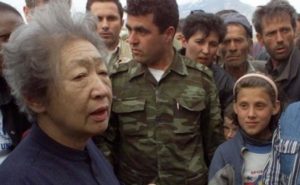Sadako Ogata – 2002 Delta Prize Recipient
The terrorist events of September 11, 2001 made obvious to everybody the dangers of fanatical bel ief in the correctness of one’s own ideas, the dangers of intolerance, the dangers of ethnocentrism. The conviction that one’s own culture has the only correct set of beliefs and values makes conflict with others holding different beliefs and values inevitable. It produces death and destruction–and it sends people into exile.
ief in the correctness of one’s own ideas, the dangers of intolerance, the dangers of ethnocentrism. The conviction that one’s own culture has the only correct set of beliefs and values makes conflict with others holding different beliefs and values inevitable. It produces death and destruction–and it sends people into exile.
Such ethnocentric certainty is the opposite of global understanding, which the Delta Prize was designed to honor. The increased understanding of and respect for cultures different from one’s own is the only way we can imagine for the world’s diverse peoples to come together to make a more peaceful global society. Delta Air Lines and The University of Georgia established the Delta Prize to pay tribute to individuals who, by their extraordinary efforts, have significantly advanced intercultural understanding and have thereby made the planet safer for all its inhabitants.
The Delta Prize was awarded in 1999 to President and Mrs. Jimmy Carter and The Carter Center; in 2000 to Archbishop Desmond Tutu; and in 2001 to President Mikhail Gorbachev. In 2002 it is awarded to Mrs. Sadako Ogata for her leadership in promoting human rights, drawing the world’s attention to the plight of refugees, and bringing about more peaceful and productive interaction among groups once at war with one another.
Mrs. Ogata is a scholar, with a PhD in Political Science from the University of California at Berkeley, a diplomat, and a public servant. In 1978 she was appointed Envoy Extraordinary and Minister Plenipotentiary at the Permanent Mission of Japan to the United Nations. At the United Nations, she later chaired the Executive Board of UNICEF, the United Nations Children’s Fund; she represented Japan on the United Nations Commission on Human Rights; and she won election, three times, to the post of United Nations High Commissioner for Refugees. She has also received over twenty-five awards for her efforts to bring about more harmonious intercultural relations.
During her time at the UN Mrs. Ogata organized aid for refugees in Iran, Turkey, Bosnia, Liberia, the Great Lakes Region in Africa, Indonesia, Kosovo, West Timor, Guinea, and other troubled parts of our world.
On many occasions, Mrs. Ogata has emphasized the importance of cooperation. “Refugees,” she argues, “are a real, global responsibility,” requiring collaboration among governments, humanitarian organizations, and the business community.
In 2000, Mrs. Ogata initiated a pilot project, called “Imagine Coexistence,” to bring about reconciliation between previously warring groups: It provides support to small, community-based inter-ethnic income-generating activities, which then spawn other inter-ethnic activities in such realms as sports and theatre. It thereby stimulates productive communication among groups of people who once interacted only in hatred. The project “Imagine Coexistence” exemplifies the belief that is the foundation for the Delta Prize for Global Understanding: that communication can lead to understanding.
Mrs. Ogata ended her ten-year position as High Commissioner for Refugees in December of 2000. But she did not cease her humanitarian efforts. After the war in Afghanistan, she assumed leadership in the rebuilding of that country; she co-chaired last January’s International Conference on Reconstruction Assistance to Afghanistan. And she is co-chairing the Commission on Human Security, an organization designed to address critical threats to human security, such as conflict, poverty, infectious diseases, and human rights violations.
Mrs. Ogata is currently Scholar in Residence at The Ford Foundation.
We are pleased that the 2002 Delta Prize for Global Understanding has been awarded to Mrs. Sadako Ogata, who is teaching people everywhere to “imagine coexistence.”
